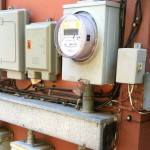Paying for Energy Efficiency Programs: Texas Industry Opts Out

Dave Fehling/StateImpact Texas
Big industrial plants like these near homes in Houston don't have to pay into fund, homeowners do
It’s one of those charges on your electric bill that can be a blur of little figures. It’s called the Energy Efficiency Cost Recovery Factor and on a recent bill of a Houston customer it added $1.02 to the total. (It applies in “competitive” markets like Houston and Dallas but not in places with cooperatives or municipally-owned utilities like Austin and San Antonio.)
A buck may not sound like much but when you add up what’s collected annually from millions of Texas residential and commercial customers, it’s serious money.
Last year, in the Houston region served by CenterPoint, it amounted to $34 million. In North Texas, served by Oncor, it totaled $51 million. The money went toward things like weatherizing homes, upgrading air conditioning systems and paying businesses to reduce electricity use on the hottest days. It’s all part of an effort to meet government mandates to reduce total energy consumption.

Dave Fehlng/StateImpact Texas
The University of Texas School of Nursing building in Houston was built to save energy and water. Use of "daylighting" and occupancy sensors (that turn lights on and off) help reduce electricity by 33%. Five tanks store rain and graywater, reducing city water use by 93% according to UT Health Science Center at Houston.
Industry Exemption
But it’s one charge that big industrial customers don’t pay. Next month, the Texas Public Utility Commission (PUC) is scheduled to consider arguments for and against increasing the number of “industrial” customers that could qualify to opt out of paying the fee.
“Enabling opt-out for certain (customers) reduces available funding and likely undermines public support for the programs by shifting costs to remaining (customers),” said Russel Smith of the Texas Renewable Energy Industries Association in a filing to the PUC.
In 2007, the Texas legislature allowed industrial customers to stop paying into the program. Industry lobbyists had argued that since energy is the biggest cost of doing business, industry already had enough incentive to “minimize their energy costs in order to remain globally competitive” according to a filing by the Texas Industrial Energy Consumers (TIEC) group. So with no need for assistance from energy efficiency funds, industry groups said there was no reason to contribute.
Neither the TIEC nor the Texas Association of Manufacturers would comment on the record to StateImpact about this issue.
Texas Drops in Ranking
Compared to other states, Texas had been a leader in saving energy, an issue increasingly important as some warn the state is running out of electricity.
“Texas was the first state in the union to establish an energy efficiency goal. They did that in 1999,” said Anna Chittum, a researcher with the American Council for an Energy-Efficient Economy.

Dave Fehling/StateImpact Texas
Learning to save: seminar in Houston at the Gulf Coast Chapter of the U.S. Green Building Council. It's part of the AUDIO version of this story.
In 2006, the group’s State Energy Efficiency Scorecard ranked Texas 11th best in the nation. But since then, Texas’s ranking has fallen. It’s now at 33rd. Chittum told StateImpact that while the drop is partly because other states caught up and became more aggressive, a big factor was letting industry opt out of paying into efficiency funds, something Chittum said most state’s don’t allow.
“The largest industrials in Texas actually don’t participate in the energy efficiency programming. So they don’t pay for it but they don’t get to take advantage of the actual programs,” said Chittum.
When the PUC meets September 13, the issue is on the agenda. Changes have been proposed in how the fee is charged to commercial customers and whether certain businesses that currently are not listed as “industrial customers” could also be exempted from paying into the energy efficiency funds.
